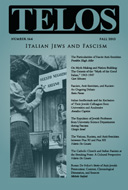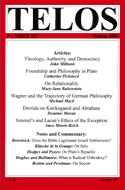 On Saturday, October 26, the Telos-Paul Piccone Institute and the Centro Primo Levi will host a panel discussion on Telos 164: Italian Jews and Fascism. The discussion will be held at Casa Italiana Zerilli Marimò, 24 West 12th Street, in New York City, from 1 pm to 4pm. We hope to see you there
On Saturday, October 26, the Telos-Paul Piccone Institute and the Centro Primo Levi will host a panel discussion on Telos 164: Italian Jews and Fascism. The discussion will be held at Casa Italiana Zerilli Marimò, 24 West 12th Street, in New York City, from 1 pm to 4pm. We hope to see you there
|
Telos 164 (Summer 2013) is now available for purchase in our store. As an occasional feature on TELOSscope, we highlight a past Telos article whose critical insights continue to illuminate our thinking and challenge our assumptions. Today, Katherine McGinity looks at Michael Mack’s “Richard Wagner and the Trajectory of Transcendental Philosophy,” from Telos 123 (Spring 2002). The process by which the Nazis rapidly removed potential regime opponents from the universities and the civil service came to be known as Gleichschaltung. Sometimes translated as “coordination,” the term is much harsher: all concerned are made the same, arranged in a single order, forced into uniformity. All that is different is made identical, and that which is non-identical is eradicated The Associate Press now reports that Iranian President Ahmadinejad has called for a purge of secular and liberal faculty from the universities. In fact, precisely such a purge of liberals and leftists took place in the wake of the Islamic Revolution of 1979—which makes it even more curious that parts of the western left somehow still look to Iran as a positive anti-imperialist force—but some reformist elements have later reemerged. The current call for renewed attacks on intellectuals indicates an effort to amplify the regime’s extremist position. It surely shatters any hope that the recent release from prison of critical intellectual Ramin Jahanbegloo (discussed here on August 31) would initiate a liberalization. Despite the approaching mid-term elections and the criticism of the Bush administration’s conduct of foreign policy, the left—domestically and internationally—has had a hard time in articulating an alternative positive vision. “Not Bush” only gets you so far: sooner or later a substantive alternative is needed to give opposition credibility. Facing turmoil (to say the least) in the Arab and Islamic world, what foreign policy would be preferable? Evidence demonstrates that neither “UN” nor “EU” is a believable response. But the problem is deeper than the pragmatics of current diplomacy. The left (and liberal) imagination would prefer to cast the confrontation with Islamic extremism or, yes, Islamic fascism, as a matter of imperialism and “anti-imperialism.” The terminology constitutes a treasured legacy of the left, not only from Lenin’s account of imperialism and capitalism (which then permitted him and his successors to mask Soviet Russian expansionism as somehow “anti-imperialist”) but also from a more honorable resistance in the US and Europe to imperial expansion of the late nineteenth century. In the meantime, anti-imperialism is today’s last hurrah of the traditional left. Having given up nearly all of its other principles, especially in the phase of multiculturalism and post-modernism, it drapes itself in the anti-imperialist flag as a way to remember its glory days. Hence the grotesque sight of the (extreme) left celebrating the reactionary forces of Hezbollah (ask about the role of women or the status of free unions). The problem however is that the theory of anti-imperialism—probably insufficient already a century ago—is simply irrelevant today. Exactly which natural resources are being fought for in Afghanistan, that fabled land of plenty? Which advanced capitalist company really needs to export its “surplus capital” to the Sunni triangle? And which is the national liberation movement that leads Sunni to kill Shi’a in Pakistan? None of these conceptualizations of empire and anti-imperialism is adequate to the current situation, which is very explicitly being driven by something else: either an ideological-religious fanaticism or, on a deeper cultural level, a desire for death. Let us consider the account most recently televised by our compatriot and now Al-Qaeda operative Adam Gadahn, otherwise known affectionately as “Azzam the American.” Gadahn, who has been sought by the FBI for several years aired an address on tajed.net on September 2. In it he articulates aspects of the Islamic-fascist critique of the West and, as has been widely reported, called for conversion to Islam. . . . Against the backdrop of the violence between Israel and Hezbollah in Lebanon, an interesting letter-to-the-editor appeared in the Berlin newspaper Der Tagesspiegel on July 30. The author, Dr. Mounir Herzallah, self-identifies as a Lebanese Shiite and comments: “Until 2002, I lived in a small village in the south of Lebanon near Mardschajun, with a majority population of Shiites, like myself. After Israel’s departure from Lebanon, it did not take long for Hezbollah to show up and to take over, not only with us but in all the neighboring villages as well. Greeted as successful resistance fighters, they came loaded with arms and, in our village too, they constructed missile storage facilities in an underground bunker. The social work of the Party of God entailed building a school and an apartment building right on top of the bunker! A local sheikh explained to me, with a smile, that the Jews would lose in any case: either because they would be hit with the missiles or because, should they attack the missile storage, they would be condemned by the world public due to ensuing civilian deaths. The [Hezbollah] was not at all interested in the Lebanese people; they only used them as shields and—when they were dead—as propaganda. As long as Hezbollah remains there, there will be no peace and quiet.” (my translation) The connection between war and welfare—schools on top of bunkers—is intriguing and reminiscent of other “guns and butter” debates. So is the simultaneous suggestion that Hezbollah merely instrumentalizes the local population: it may claim to be fighting in the name of some population, in order to invoke a democratic legitimacy, but in fact it only uses the locals as human shields. Hence also the reports that in some instances Hezbollah has prevented civilian departures from the warfront in Southern Lebanon precisely in order to increase casualty rates. One notes similarly the willingness to tolerate deaths when its own missiles hit Israeli Arabs. This predisposition of an extremist political movement to argue, occasionally, with a democratizing rhetoric (defending a people) while in fact disregarding the lives of the people is a symptomatic feature of totalitarian mentalities: neither Hitler nor Stalin cared much about the numbers of their own who were lost. |
||||
|
Telos Press Publishing · PO Box 811 · Candor, NY 13743 · Phone: 212-228-6479 Privacy Policy · Data Protection Copyright © 2024 Telos Press Publishing · All Rights Reserved |
||||
 Michael Mack’s “Richard Wagner and the Trajectory of Transcendental Philosophy” explores the differing brands of anti-Semitism in Kant, Hegel, Feuerbach, and Schopenhauer, and explains how their scrutiny of Jews as a hindrance to society was radicalized by Richard Wagner. Mack details how each philosopher’s particular form of anti-Semitism fed into Wagner’s social-political writings as well as his “total works of art.” By investigating the concepts put forth by Wagner’s philosophical predecessors, one can more fully understand how a radicalized version of Kantian moral philosophy infiltrated German national culture through the composer’s art. Mack specifically addresses how these ideas manifested in Wagner’s Ring Cycle.
Michael Mack’s “Richard Wagner and the Trajectory of Transcendental Philosophy” explores the differing brands of anti-Semitism in Kant, Hegel, Feuerbach, and Schopenhauer, and explains how their scrutiny of Jews as a hindrance to society was radicalized by Richard Wagner. Mack details how each philosopher’s particular form of anti-Semitism fed into Wagner’s social-political writings as well as his “total works of art.” By investigating the concepts put forth by Wagner’s philosophical predecessors, one can more fully understand how a radicalized version of Kantian moral philosophy infiltrated German national culture through the composer’s art. Mack specifically addresses how these ideas manifested in Wagner’s Ring Cycle. 






